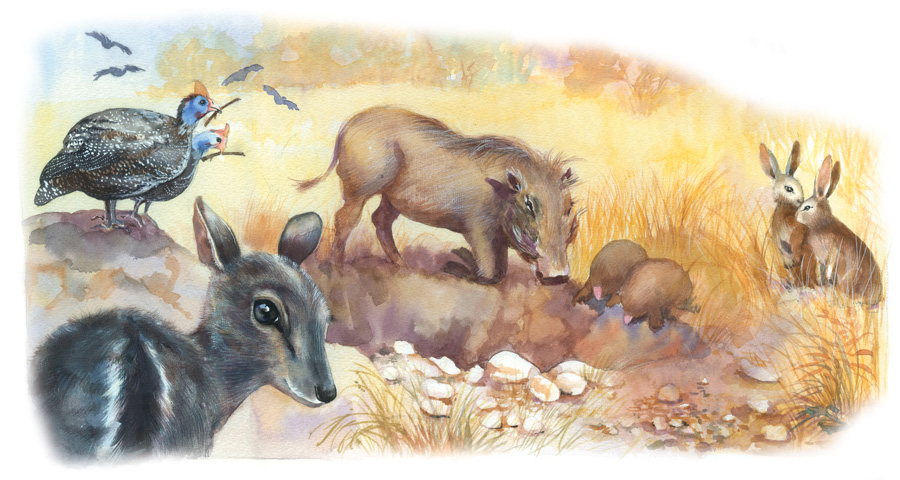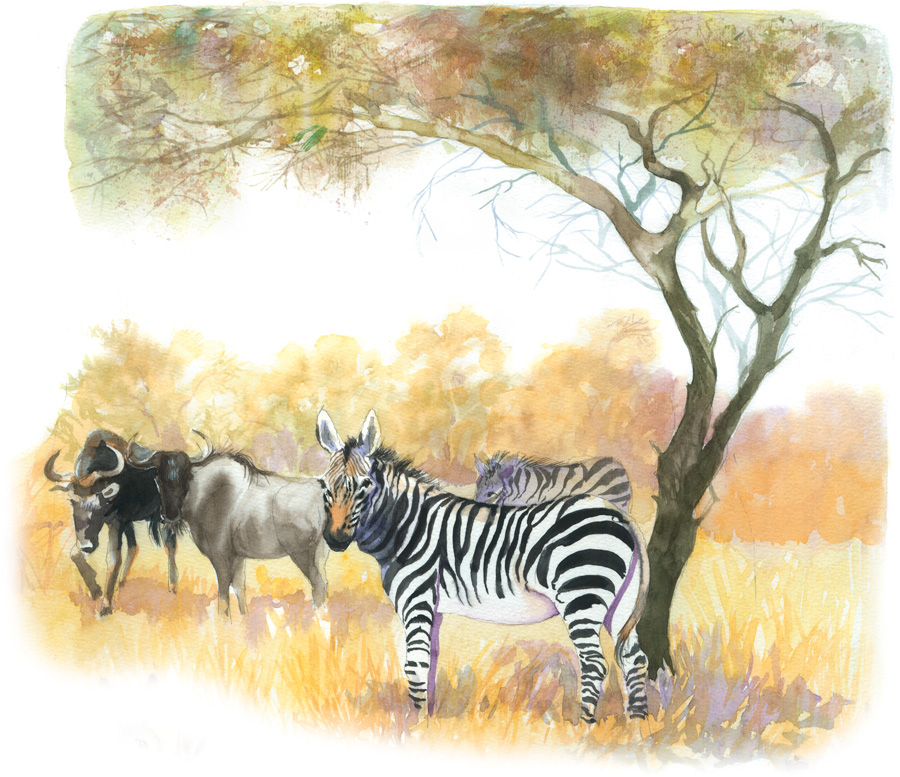
Tortoise crept along a sandy, bald patch of grass, heading for the shade. Occasionally she paused, reflecting on how far she had travelled. And, of course, every now and then, she was side-tracked by the new leaves on shrubs, made succulent by the first summer rains.
Zebra and wildebeest congregated in the spiky acacia shadows, trying to escape the searing heat of the midday sun. Even the warthog retreated from the oppressive heat that hovered in the air.
Energized by the shade of the trees, Tortoise crept further and further into the undergrowth, only noticing Duiker when he stood up from his leafy bed.
‘Sorry to have startled you, Duiker,’ said Tortoise politely. ‘It’s so cool here.’
‘I prefer to stay here all day,’ said Duiker. ‘I dare not be seen during the day. Crowned eagle has a nestling to feed.’
‘So, you’re not very brave, Duiker,’ teased Tortoise.

‘Well, you’re not very fast, are you, Tortoise?’ teased Duiker in return.
‘Slow, but sure,’ laughed Tortoise.
‘Excuse me,’ interrupted the warthog. ‘There is only one way to test courage … and that’s by fire.’
‘He’s right,’ said Tortoise flippantly. ‘Let us put our courage to the test, Duiker.’
Duiker hesitated, knowing he was terrified of flames, but then he realised how cowardly he would seem to the other animals of the veld. So he agreed, but only half-heartedly.

The challenge attracted a great deal of interest and the grassland inhabitants crowded around.
‘I’ll dig a hole in which we can build the fire,’ volunteered the warthog. ‘And I’ll also ask the springhares and moles to help me. We’re all expert excavators.’
‘We’ll collect the firewood,’ said a guinea-fowl.
‘And we’ll help too,’ said the leader of the turtle doves from his perch overhanging the gathering.
While all the activity continued around him, Duiker took very little interest. He went back to his cool place in the wooded area and lay down lazily in the shade. Tortoise nibbled at a few juicy leaves for a while and then rested too.
It was only when the bundle of thorny firewood was placed beside the hole that Tortoise realised that the test of her courage was soon to take place.
‘Duiker,’ pleaded Tortoise, ‘please let me go first.’
Duiker was relieved and readily agreed.
‘I’m going to get some sleep now,’ said Tortoise. ‘I’ll see you in the morning.’
Tortoise crept home and waited for night to hide the colours and shapes of the grassland. But a white moon rose in the sky, the colour of ash, and gave her just enough light to scuffle unseen through the bushy undergrowth.
She quickly dug a burrow that led out of the hole the animals had made for the fire, and then hid the entrance to the tunnel with branches. Then she went home to sleep.
The next morning, Duiker and the grassland birds and beasts had already gathered at the hole by the time Tortoise arrived.
‘Thought your courage had failed you,’ laughed Duiker. ‘You never were very brave.’
Watched by all the animals, Tortoise went down, down into the hole and then shouted in a muffled voice: ‘You can start the fire now!’
Duiker threw the firewood gathered by the birds into the dark hole and trampled it down with his hooves. Then in an elated mood, he rubbed firestones together causing the first spark.
The wood in the pit hissed and sparked as it surrendered to the fire. The grassland animals and birds stepped back to avoid the smoke and heat of the soaring flames.
‘Poor Tortoise,’ they sighed.
But, long before the flames could reach her, Tortoise had cunningly crept into the burrow she had prepared the night before. She had brought two seed-pods with her and when they were heated by the flames, they exploded in the fire.
‘Tortoise’s eyes have popped!’ wailed the warthog.
‘She should never have volunteered to go first,’ said the guinea-fowl.
Duiker enthusiastically fed the hungry fire all day. It gobbled the dry sticks and branches and by dusk it had burned itself out.
Duiker went home, curled up on his soft leafy bed and fell asleep.

Tortoise slept well too. Early the next morning, she crept back along the tunnel of the firepit. After testing that the ashes were cool, Tortoise rolled around in the remains of the fire until her shell was completely covered with the ashen dust. Then she lay on her back with her eyes closed.
Duiker rose early and looked for a wild olive branch. He tore off a stick and sharpened it until it had a fine point.
‘I’ll never have to listen to that Tortoise again,’ he said, peering into the pit.
He struck Tortoise’s shell harshly.
But Tortoise slowly rolled over and answered: ‘Duiker, I warned you that my courage could stand the test of fire.’
Duiker was stunned into silence. The birds and the beasts couldn’t believe that Tortoise had survived the awful heat of the fire.
‘Now it’s your turn, Duiker,’ said the warthog.
‘I’m not afraid,’ replied Duiker. ‘How good of you all to come and witness my victory.’
Suddenly Tortoise said: ‘Please would you help me dig a new hole? Duiker should have a larger and more comfortable hole than I had.’
The warthog led the work party once again and they dug all through the day.
The next morning, before the dew had evaporated in the glow of the sun, Duiker went down into the deep, deep hole. Alas! No tunnel had been built.
The firewood was put in position in the pit. It was lit and soon tongues of flames licked the air. A popping sound was heard.
‘Duiker’s eyes,’ said the warthog sadly.
Tortoise kept the fire smouldering all day and went home at sunset.
The next day, when the acacias and wild olive trees came to life with the chorus of grassland birds, Tortoise went to the hole.
Duiker’s horns were the only parts which had not been burnt by the scalding flames, so Tortoise cleaned them, shone them and made them into musical instruments. From that day on, Tortoise’s song sounded through the grasslands as the wind whisked them into motion:
Poor Duiker, Poor Duiker,
He died so young,
as the flames engulfed him.
How sad!
The Blue Duiker

The timid blue duiker is the smallest antelope in southern Africa, and prefers to stay hidden among thick bush or leafy forests. It ventures out mostly at night and is usually found alone. The blue duiker feeds on leaves and fruit – particularly its favourite wild figs. Its main predators are eagles, pythons and, of course, man. Both males and females have horns and their grey-brown coat enables them to be well-camouflaged in their bushy surroundings.